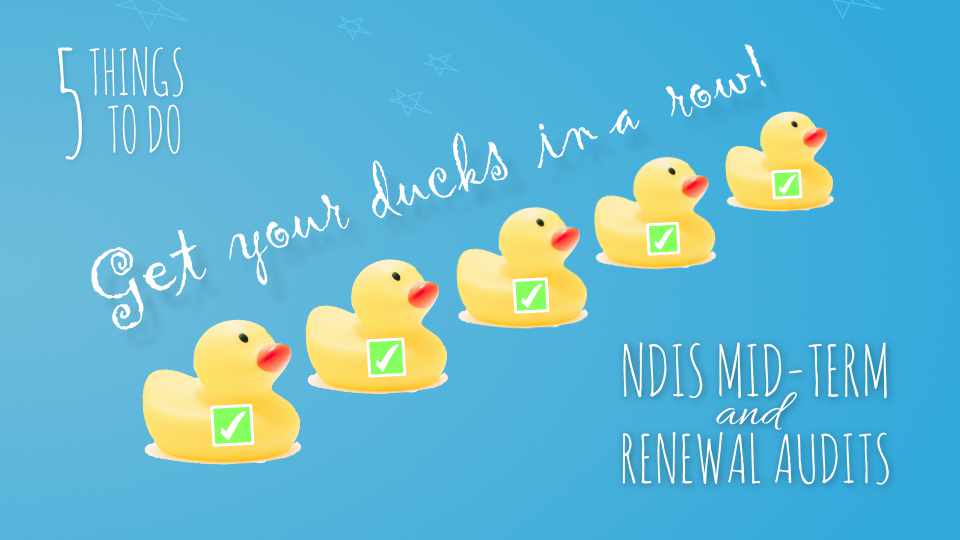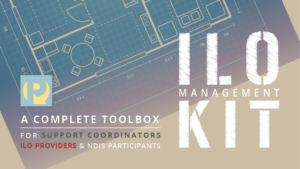What’s the best way to prepare for NDIS mid-term and renewal audits? Start by thinking about what audits aim to achieve. That’s the outcomes listed in the NDIS Practice Standards. There are a lot of them — too many to think about at one time. It’s always helpful to simplify, so we’ve identified five key area to focus on when preparing for a NDIS mid-term or renewal audit. If your organisation stays on top of these and —provided there are no outstanding actions from your previous audit — you’ll be ready for any NDIS audit, anytime.
1. Familiarity with the NDIS Practice Standards
NDIS renewal audits always pay extra attention to Participant Rights and Responsibilities. Both NDIS renewal and mid-term audits assess Governance and Operational Management, and Complaints and Incidents — so be prepared.
Staff can do more to support ongoing compliance if they understand what the NDIS Practice Standards aim to achieve. Make sure staff know how your organisation protects and promotes participant rights. Which documents are relevant? How can participants lodge complaints — which processes are relevant and how does the organisation respond?
2. Clear Documentation and Record-Keeping
Auditors want to know that information is circulating through the organisation to where it’s needed. Well-organised documentation not only demonstrates compliance but also facilitates efficient service delivery and decision-making. That means clear policies and procedures, participant information, staff files, incident reports and complaints. So, make sure all records are up-to-date and easily accessible.
3. Participant-Centred Approach
A participant-centred approach is at the heart of the NDIS. How does your organisation meet the unique needs and preferences of each participant? How can you demonstrate this? Expect to show how your approach to assessment, plan development, and service delivery maximizes participant choice and control. This would include documented risk assessments, individualised support plans, communication records, and feedback mechanisms. You’re already doing that — great! And you’ve made sure those risk assessments have been implemented and reviewed? Even better.
4. Continuous Improvement and Monitoring
Improvement is an NDIS compliance requirement — but what to improve? Anything that reduces risk is always an improvement. Start by reviewing your complaints and incidents for any improvements that could reduce risk and increase participant satisfaction. Ask participants, families, and staff for feedback. Make it a policy to do it regularly and keep records.
You need a system that makes sure your improvements actually… you know… improve things. A robust system. How do you record, monitor, evaluate, and review the changes? Is your system a bit hit-and-miss? Does it need improvement? If so, add it to your Continuous Improvement Plan.
5. Staff Training and Development
Invest in staff training and development — it’s a requirement! Ensuring your team understands these key compliance areas can be part of that training: the NDIS Practice Standards, the policies and procedures relevant to their work, the participant-centred approach. You can conduct training as regular sessions, at team meetings, or by email. Keep good records!
Conclusion
Address these five key areas — adherence to standards, clear documentation, participant-centred care, continuous improvement, and staff training — and you’ll meet compliance requirements. Plus, you’ll enhance the overall quality of services you provide.
Review each area and identify processes that aren’t working well enough. Schedule reviews throughout the NDIS registration cycle, one area at a time — it will be more effective and efficient because problems will more likely be identified early. The entire review process, called an Internal Audit, is a compliance requirement for NDIS Certification.
Internal Audits are the best way to ensure that you’re compliant and ready for audit. They provide essential data for prioritising the audit preparation tasks and for planning responses to problems. They also contribute directly to the Quality processes that auditors assess, such as improvement and risk reduction — that means more effective services and more satisfied clients.
Better still if you get professional support to conduct internal audits. PQplus Internal Audits are designed for added value — greater staff capacity, smoother running organisations, and peace of mind.
PQplus engages full-time with NDIS Quality and Safeguards, with Auditing Bodies, with other NDIS Quality professionals, and with NDIS providers of all kinds. Your organisation can benefit from their deep understanding and practical approach.
You can learn more about PQplus Internal Audits here. About NDIS mid-term and renewal audits. And about PQplus Audit Support.
Or simply arrange a free consultation.




